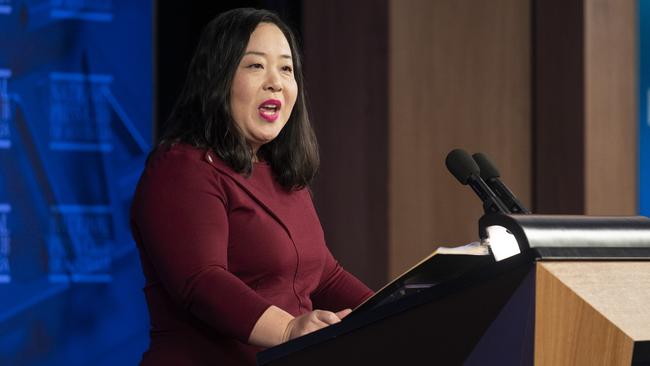
There is an undercurrent for change in the nation’s capital after 23 years of Labor and Greens rule but the proportional representation system and preference flows make it near impossible for conservatives to wrestle back power.
Boasting one of the nation’s worst budgets and health systems, Canberrans are not immune to a cost-of-living and housing crisis exacerbated by their city being Australia’s most expensive.
Liberals leader Elizabeth Lee – a Korean-Australian who has faced internal clashes and pessimism in party ranks after years of electoral despair – is seeking to become the first conservative since Kate Carnell in 1998 to win an ACT election.
Three days out from Saturday’s election, and with more than 100,000 expected to have voted or submitted postal ballots before polling day, Lee on Wednesday snapped at a journalist following a leaders’ debate with Andrew Barr.
The faux outrage of keyboard warriors denouncing Lee for “flipping the bird” at a badgering reporter will have little impact on an election underpinned by a system that favours a Labor-Greens coalition.
The last Liberal leader to win the popular vote but edged by Katy Gallagher in forming government despite winning the same number of seats was Zed Seselja in 2012.
Under pressure to overcome what many consider an insurmountable challenge – with left-wing public servants and academics propping-up the Labor-Greens alliance – Lee lashed out in the campaign’s dying days.
“Elizabeth cracked under pressure and lost her cool. But … she’s let everyone know who she is and that she’s up for the fight,” a Liberal source said.
A veteran campaigner quipped: “Canberra’s inner suburbs are as far away from real Australia as you can get.”
The introduction of the David Pocock-backed Independents for Canberra has shaken up the electoral landscape and spooked Labor-Greens strategists. Independents’ sources say their best-case scenario is winning five seats but it was likely their candidates, led by Tom Emerson, would land three seats.
Independents are picking up backlash among voters against the extremist Greens party, which hit a high watermark of six seats at the 2020 election. Family First candidate Elizabeth Kikkert, dumped by the Liberals last month after serving the party in parliament since 2016, threatens to steal a seat from her former colleagues.
The Liberals’ last victory in 1998 was forged off the back of support from independent MPs and The Australian understands relations between Lee and Independents for Canberra candidates are favourable.
In the race for 13 seats and majority government, Liberal sources believe their best case scenario is 10 or 11 seats. A majority pathway emerges if Independents for Canberra claim two or three seats. “ID profile in ACT elections has an enormous influence on results,” a Liberal said.
“There could also be swings against both major parties. It’s hard to get a read on the level of frustration in the community but cost-of-living pressures and even Anthony Albanese’s performance will have impacts.”
Barr, the lone survivor of Scott Morrison’s pandemic-era national cabinet who has run a safe and disciplined campaign, would become Australia’s sixth longest-serving political leader if he wins on Saturday and completes a four-year term.
At 51, he is known to harbour ambition for a shift into the Senate.
After replacing Gallagher as Chief Minister in 2014, Barr recently overtook former Labor leader Jon Stanhope as the Territory’s longest-serving chief.
A longtime critic of Barr, Stanhope recently wrote: “The unbroken string of 12 deficits delivered … by Andrew Barr as Treasurer is not only a record for any Australian jurisdiction, but also for a single treasurer.”
Incumbency favours ACT MPs being returned regardless of performance, records and ability.




The Liberals and fledgling independents movement in the Labor-Greens socialist hotbed otherwise known as Canberra are eyeing a narrow path to victory under the ACT’s outdated Hare-Clark electoral system.